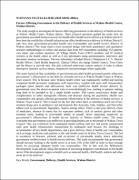| dc.description.abstract | WANYANA SYLIVIA KAJUBI (2010-MO92-20042)
Factors Affecting Government in the Delivery of Health Services at Wakiso Health Centre, Wakiso District.
The study sought to investigate the factors affecting government in the delivery of health services at Wakiso Health Centre, Wakiso district. Three research questions guided the study; how do government-provided human resources for health affect health service delivery in Wakiso district?; how does the availability of health infrastructure affect health service delivery in Wakiso District?; and, how does government-provided health care consumables and health service delivery in Wakiso district? The study used a cross sectional design with both quantitative and qualitative research methodologies to collect and analyse data from 185 respondents including 152 patients, care takers and resident members, 20 Village Health Team (VHT) members and 07 medical workers at the health centre as well as 6 key informants using questionnaires, interviews and document analysis techniques. The key informants included District Chairperson LC V, District Health Officer, Chief Health Inspector, Clinical Officer (In charge Health Centre), Town Clerk and the Mayor to provide data. The data collected underwent content analysis in order to obtain descriptive statistics such as means, frequencies and percentages where applicable.
The study found out that availability of government-provided health personnel greatly influences government‟s effectiveness in the delivery of health services at Wakiso Health Centre in Wakiso town council. This is because since Wakiso health centre was inadequately staffed and lacking competent health personnel, inadequate staff supervision, coupled with poor staff remuneration packages (poor salaries and allowances), there was ineffective health service delivery by government since the doctor-to-patient ratio is overwhelmingly low, leading to patients making long lines to be attended to by a single health worker. This causes unnecessary deaths and complications of rather manageable ailments and diseases among the population. Health care consumables also greatly affected government effectiveness in the delivery of health services at Wakiso Town Council. This is based on the fact that when there is continuous stock out of key essential drugs such as antibiotics and antimalarials like Amoxilin, Zink, Sulphur, and Pain killer tablets such as paracetamol, Ibgrophen, Aspirin among others. There is also poor delivery chain of medicines, absence of mama kits for expectant mothers, lack of sanitary gloves and other essential items, leading to preventable deaths of people, hence impacting negatively on government‟s effectiveness in health service delivery at Wakiso health centre. The study concluded that government was ineffective in providing health care to the people of Wakiso Town Council. This was evidenced from inadequate health staffing with few and poorly remunerated staff, poor health infrastructure characterised by inadequate staff houses, few buildings to accommodate all key health departments, and a poor delivery chain of health care consumables such as drugs, medicines and sundries at the only health centre in Wakiso Town Council. This led to escalation of diseases, ailments and occurrence of preventable deaths, hence indicating government ineffectiveness in health service delivery. The study recommended that government should increase funding to the health sector to at least 15% of the GDP in order to have enough funds for procuring adequate health care consumables. This in line with the Millennium Development Goals and the Abuja Declaration of increasing budgetary contributions to the health sector if the development targets on health such as maternal health, child health, malaria and other areas are to be achieved.
Key Words: Government, Delivery, Health Services, Wakiso District. | en_US |


